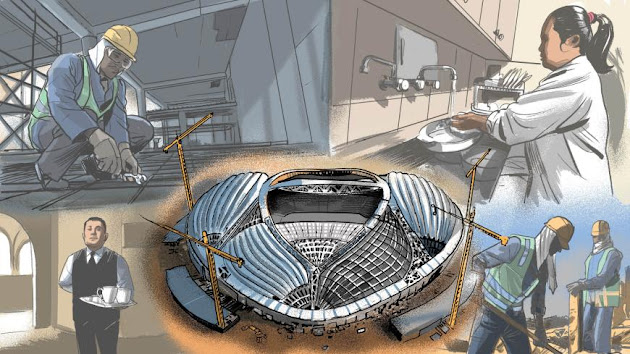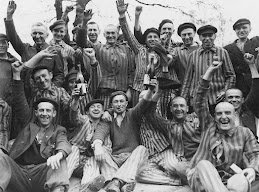Qatar looks ready for the 2022 World Cup, but at what cost?
Every four years the FIFA World Cup of football is held. Every time it is an amazing festival for football fans worldwide. Awarded with hosting the 2022 World Cup, Qatar has been working around the clock to get their country ready to welcome players and fans alike to give them the best football experience. Ever since FIFA announced Qatar as hosting country, there has been a lot of controversy surrounding the event and the country as a whole, and things do not seem to get better…
The Kafala system
Qatar has a really bad reputation when it comes to workers rights. Qatar has something called the Kafala system, better known as the sponsorship system. The Kafala defines the relationship between foreign workers and their local sponsor, usually the employer. Qatar is not the only country implementing this system for it’s immigrant workforce; countries like Bahrain, Saudi Arabia and the United Arab Emirates have the same system in place.
In this system the sponsor is responsible for the migrant worker. The employer in this case is responsible for travel expenses, housing but also the legal status of the immigrant, meaning only the employer can supply the workers with valid visas. In reality this means the employer has total control over his employees. The Kafala system falls under the jurisdiction of the interior ministry and not the labor ministry, meaning immigrant workers are not protected under labour laws such as the right to enter labour disputes or forming and joining a union.
This provides them with the opportunity to exploit their workers. Often immigrants need the employer's permission to end their employment or transfer jobs. Workers get their passports confiscated, meaning they cannot leave the country without the employer’s permission. Without said permission the immigrants risk termination of their legal status or even potential imprisonment and deportation, even when the worker is running from abuse.
What about the World Cup?
Hosting the world cup is a great way to promote your own country, tourism usually spikes and the economy of the country thrives, not to mention the funds the country receives for organising it. The World Cup of 2022 is said to contribute over 20 billion US dollars to the Qatari economy. (Q&A: Migrant Worker Abuses in Qatar and FIFA World Cup 2022, 2021)
In order to host the World Cup Qatar renovated all of its stadiums to fulfill the requirements set by FIFA. During the construction works almost exclusively immigrants were employed. But it wasn’t until 2017 when an explosive report came out stating at least 6,500 migrant workers had died due to their working conditions a wave of controversy hit (Pattisson & McIntyre, 2021). At least 70% of those deaths remain unexplained by the Qatari government. (Pattisson, 2021) Amnesty International is an organisation aiming at protecting human rights and they have been monitoring the events in Qatar closely, talking to immigrants, trying to infiltrate the construction sites in order to discover in what circumstances immigrant workers have to work and live. What they have found is simply staggering.
Employers have to pay recruitment fees for getting immigrants in their workforce, however, usually these fees are passed on to the immigrant workers themselves. These fees range from 500 up till 4,300 dollars, resulting in big debts for the immigrants before they even arrive in their hosting country. Workers live often in appalling living conditions, often in camps or in the stadiums they are building. Immigrants often sleep in bunk beds in rooms with more than eight other people. This while Qatari labour laws prohibit the use of bunk beds and limit the amount of people per room to four. Lies about the worker’s salary are not uncommon. They are often paid less than they were promised in their home countries and when they address this problem they are told to shut up and threatened with revoking their workers visa. Sometimes workers have to wait to get paid for several months, resulting in late loan payments, being unable to buy food or sending money back home. After the 2017 controversy, Qatar promised to implement reforms to improve workers' conditions. Yet the only real reforms that seem to have taken place is the removal of obstacles to either transfer jobs or leave the country. (Qatar World Cup of Shame, n.d.)
The ugly side of the beautiful game
But what does FIFA say about all of this? FIFA has been remarkably silent among all of the controversy surrounding the next World Cup. Under pressure from several human rights organisations, fans and even football players, FIFA adopted the United Nations Guiding Principles on Business and Human Rights back in 2016 and implemented a Human Rights Policy in 2017. Their Human Rights Policy states the following: “FIFA is committed to respecting all internationally recognised human rights and shall strive to promote protection of these rights” (FIFA, 2017). While FIFA ‘strives’ to protect human rights, they certainly have failed to do so in Qatar, still not having pressured Qatar to follow the human rights conventions of the UN. Despite the authority to take action, FIFA has actively ignored the abuses, wage thefts and living circumstances of the workers building the stadiums and dying for the organisation of the World Cup.
Norwegian team protesting events in Qatar, photo by NFF
Football players have spoken out about the abuses in games they played wearing t-shirts saying “human rights both on and off the pitch”. While the sentiment might seem nice, some t-shirts do not save workers from starvation, abuse and finally death. One might think both fans and players would not want to be in stadiums where thousands of workers have died. Yet, none of the qualifying countries has cancelled their participation in the World Cup.
The question of responsibility
Now, the question arises whether we should hold FIFA accountable for what happened and what continues to happen in Qatar. Some would say we cannot hold an organisation responsible for football worldwide accountable for a country’s policy on human rights. But there are many arguments contradicting this statement. Perhaps the most important one is that, while FIFA is an organisation mainly responsible for football, they are responsible for awarding countries with hosting the World Cup. Therefore FIFA should have known that awarding Qatar with this honour would have human rights abuses and deaths as a consequence. While we focus mainly on the labour policies in Qatar, this is not the only controversy the country faces. Same-sex relationships are illegal and are punished by death, anti-discrimination laws are non-existent, …
What can we do?
FIFA does not seem to do anything about the situation in Qatar and all of FIFA’s sponsors seem to keep quiet as well. But is there anything you can do? Yes! We can keep pressuring FIFA to uphold higher standards involving human rights and urge the Qatari authorities to dismantle their abusive kafala system as it has repeatedly promised. Finally if none of this helps, we as fans can draw a line and refuse to watch and follow this World Cup. We need to show that ignoring human rights for the sake of profit is unacceptable and inhumane. I know I, for one, will not stand for it. And while I absolutely love football and am always excited about the magical, amazing tournament the world cup truly is, I will not be watching this year.
Article by Arne van Parijs
References
Cornwell, A., & Osmond, E. (2021, June 23). Qatar committed to improving worker welfare, says World Cup 2022 organiser. Reuters. Retrieved January 7, 2022, from https://www.reuters.com/world/middle-east/qatar-committed-improving-worker-welfare-says-world-cup-2022-organiser-2021-06-23/
FIFA. (2017, May). FIFA's Human Rights Policy. FIFA.
Pattisson, P. (2021, August 26). Qatar has failed to explain up to 70% of migrant worker deaths in past 10 years – Amnesty. The Guardian. https://www.theguardian.com/global-development/2021/aug/26/qatar-has-failed-to-explain-up-to-70-of-migrant-worker-deaths-in-past-10-years-amnesty
Pattisson, P., & McIntyre, N. (2021, February 23). Revealed: 6500 migrant workers have died in Qatar since World Cup awarded. The Guardian. https://www.theguardian.com/global-development/2021/feb/23/revealed-migrant-worker-deaths-qatar-fifa-world-cup-2022
Q&A: Migrant Worker Abuses in Qatar and FIFA World Cup 2022. (2021, December 18). Human Rights Watch. Retrieved January 7, 2022, from https://www.hrw.org/news/2021/12/18/qa-migrant-worker-abuses-qatar-and-fifa-world-cup-2022
Qatar: World Cup 2022 forced labour. (2016, March 31). YouTube. Retrieved January 7, 2022, from https://www.youtube.com/watch?v=BCzEJvH0p5I
Qatar World Cup of Shame. (n.d.). Amnesty International. Retrieved January 7, 2022, from https://www.amnesty.org/en/latest/campaigns/2016/03/qatar-world-cup-of-shame/
Sullivan, J., Robinson, K., & Cholewinski, R. (2021, March 23). What Is the Kafala System? Council on Foreign Relations. Retrieved January 7, 2022, from https://www.cfr.org/backgrounder/what-kafala-system




Comments
Post a Comment